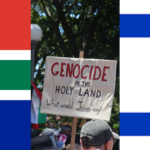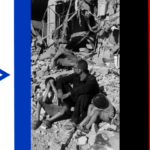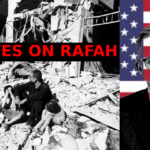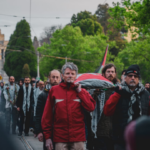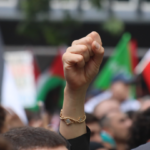“Genocide as Colonial Erasure”: Francesca Albanese’s Second Report on Gaza

In her new report Genocide as Colonial Erasure, Francesca Albanese, the UN Special Rapporteur on the situation of human rights in the Palestinian territories occupied since 1967, suggests that the last year of genocidal violence perpetrated by Israel upon Palestinians in the Gaza Strip is integral to the Zionist regime’s ultimate goal of colonising Palestine and removing as many Palestinians as possible.
This is the Italian lawyer’s second report on Gaza, with the March released Anatomy of Genocide finding there were reasonable grounds to believe the actions of the Israeli state in Gaza had met a number of thresholds indicating its committing genocide, while the new report expands the scope to include the violence that’s spread to the West Bank, including East Jerusalem.
The “good Albanese” as she’s now regularly known in this country after she put the local press in its place at the National Press Club last November, adds that while “the scale and nature of the ongoing Israeli assault” varies in different areas, the totality of “the Israeli acts of destruction directed against the totality of the Palestinian people” clearly warrant the application of the “Genocide Convention”.
Albanese assesses the Israeli-made catastrophe in Gaza through the lens of the Genocide Convention (the Convention on the Prevention and Punishment of the Crime of Genocide), the Apartheid Convention, international humanitarian, human rights, criminal and customary law. And it’s also informed by the International Court of Justice’s July finding that the Israeli occupation is unlawful.
The UN special rapporteur concludes in her 31 October released report that all nation states a party to the Genocide Convention have a legal obligation to prevent “the serious risk of its continuous breach”.
Destruction laid bare
Albanese outlines that at the time she was writing the official death toll of the Gaza genocide had surpassed 42,000 people, but the true figure was likely thousands upon thousands more. This includes more than 13,000 kids, with over 700 hundred being babies, with “many shot in the head and chest”.
And distribution sites, tents, hospitals, schools and markets have all been subjected to indiscriminate assaults.
“The magnitude of destruction in Gaza has prompted allegations of domicide, urbicide, scholasticide, medicide, cultural genocide and ecocide,” Albanese writes. “Nearly 40 million tons of debris, including unexploded ordnance and human remains, contaminate the ecosystem.”
“More than 140 temporary waste sites and 340,000 tons of waste, untreated wastewater and sewage overflow contribute to the spread of diseases such as hepatitis A, respiratory infections, diarrhoea and skin diseases,” the special rapporteur continued. “As Israeli leaders promised, Gaza has been made unfit for human life.”
The report further confirms that Israeli forces have built roads and bases in more than 26 percent of the Gaza Strip. The “buffer zone” along the Gaza border with Israel has been extended to 16 percent of the territory, while 84 percent of the Strip has been forcibly evacuated, with the majority of the population corralled into a “humanitarian zone” accounting for just 12.6 percent of the region.
And the list of atrocities appears never ceasing: 32 of 36 hospitals had been damaged within 300 days, purposeful attacks on food supplies to trigger starvation have been labelled by an Israeli minister as “justified and moral”, there’s the reemergence of polio in Gaza, as well as attacks upon polio vaccination operations, and thousands have been disappeared into torture camps.
This “wholesale destruction” is “now metastasising to the West Bank, including East Jerusalem”. This includes the 5,505 Israeli forces raids carried out in that region between October 2023 and September this year, which is amongst a long list of evidence to support this assertion.
The offence of genocide
“Even when conservatively considered, these multiple torments constitute precisely the irreparable harm that ICJ has warned against since January 2024, and which Israel has intentionally inflicted on the Palestinians as a group,” Albanese makes certain.
The International Court of Justice ruled Israel is plausibly perpetrating genocide on 26 January and ordered it to stop genocidal acts immediately.
The 1948 Genocide Convention defines genocide as “acts committed with intent to destroy, in whole or in part, a national, ethnical, racial or religious group”. There are five categories of what comprise genocidal acts: killing members of the group, causing serious bodily or mental harm, bringing about destructive conditions of life, preventing births and forcibly transferring children of the group.
Article 1 of the Genocide Convention provides that state parties, of which Australia has been since 1949, are required to actively prevent and punish a genocide taking place, whether it be perpetrated in a “time of peace or a time of war”. And in this way, the assaults upon international shipping perpetrated by the Yemini Houthis over the past year, can be seen as in line with this obligation.
Albanese outlines that the prevention and punishment, and “in particular proving genocidal intent”, is still developing. An issue she identifies is that “the stigma” attached to genocide prevents perpetrators from documenting its commission and therefore, to establish intent, “a complex assessment of facts, statements and circumstances” must be undertaken.
The lawyer further asserts that to prove genocidal intent the totality of the multiple atrocities being perpetrated with intent to destroy must be assessed, as genocide is “more structurally complex and insidious” than other atrocity crimes, such as mass killing or extermination. And “the historical and sociopolitical context in which genocide forms is “key to identifying how intent forms”.
“In settler colonial contexts, land and its resources are particularly relevant,” the special rapporteur underscores. “Land is intrinsic to both a people’s right to self-determination and the settler colonial project. An inherent conflict exists between the colonisers, who seek to acquire and control the land, and the Indigenous population, for whom the land is integral to their identity.”
So, genocidal intent is not confined to individual perpetrators, as it has been established in international criminal tribunals that this intent can be a state responsibility “without an individual being convicted of the crime”, which can be established via the assessment of the aggregate genocidal intent of individual perpetrators.
A state should not be exonerated from the charge of genocide, according to Albanese, and genocidal intent can be established via “the only reasonable inference” test.
Genocide in Australian law
Coming into effect on 1 July 2002, the Rome Statue of the International Criminal Court established not only the ICC, but it sets in place the four core international criminal offences, initially genocide, crimes against humanity and war crimes, as well as the addition of crimes of aggression in 2010.
The Rome Statute took effect in this country in September 2002, which as required, involved the Australian government passing laws in June that year to enact the initial three international atrocity crimes into federal law. And they now sit under division 268 of the Criminal Code Act 1995 (Cth).
The various forms of the core international crime of genocide are set out under sections 268.3 through to 268.7. These carry a maximum penalty of life imprisonment. Yet, in order to launch a genocide prosecution, the federal attorney general must approve it first, and this has never occurred.
Independent Senator Lidia Thorpe has a private members bill before federal parliament, the Criminal Code Amendment (Genocide, Crimes Against Humanity and War Crimes) Bill 2024, which is seeking to remove the attorney general’s fiat from the atrocity crimes, so they can no longer be blocked.
The totality reveals the crime
“The current intent to destroy the people as such could not be more evident from Israeli conduct when viewed in its totality,” Albanese’s report declares, and it adds three factors that support this.
The first is the long-term ambition of Israel to secure a greater Israel that encompasses all of the Palestinian territory. As well, Gaza has been “intentionally rendered unliveable” since last October in order to destroy the Palestinian people, and this is now spreading to the West Bank. And the third point is that the genocide has been facilitated by the broad assertion that Israel is defending itself.
Further criminal responsibility for a genocide cannot be confined to individual actors, as it must capture the responsibility of the state. “A state is obliged to prevent, to not commit and to punish genocide”. And since the ICJ plausible genocide ruling in January, it has been incumbent upon the Israeli government to stop the genocide, which it has not attempted to do.
“Instead, genocidal violence continued in Gaza with serious risk of expanding to the West Bank amid increasing genocidal incitement,” Albanese writes. “No one has been investigated or prosecuted, let alone punished.”
The UN special rapporteur reminds that the genocide is part of the century old Israeli settler colonial project. So, to halt Israeli crimes she recommends “full arms embargos and sanctions”, recognising Israel as an apartheid state, deployment of international protectors, protections for displaced Gazans, prosecution of dual citizens involved and ensuring that humanitarian aid is unhindered.
“Since its establishment, Israel has treated the occupied people as a hated encumbrance and threat to be eradicated, subjecting millions of Palestinians, for generations, to everyday indignities, mass killing, mass incarceration, forced displacement, racial segregation and apartheid,” Albanese said in concluding.
“As the world watches the first livestreamed settler colonial genocide, only justice can heal the wounds that political expedience has allowed to fester,” the international lawyer ended.
“The devastation of so many lives is an outrage to humanity and all that international law stands for.”


